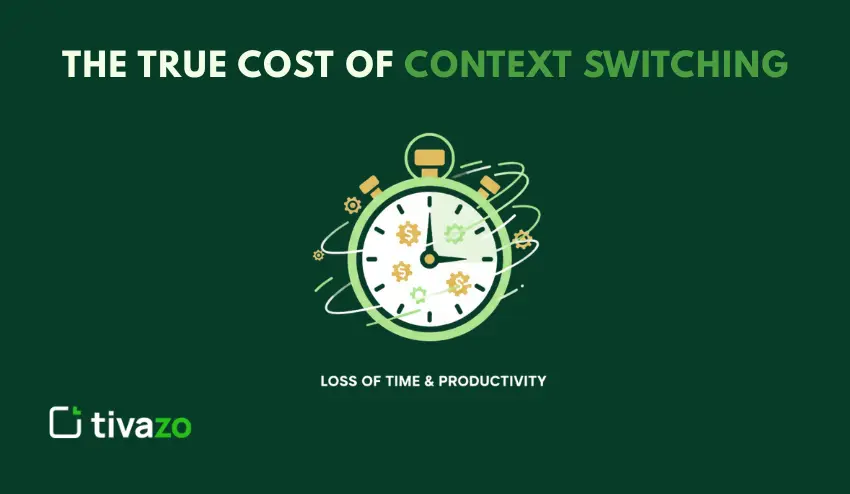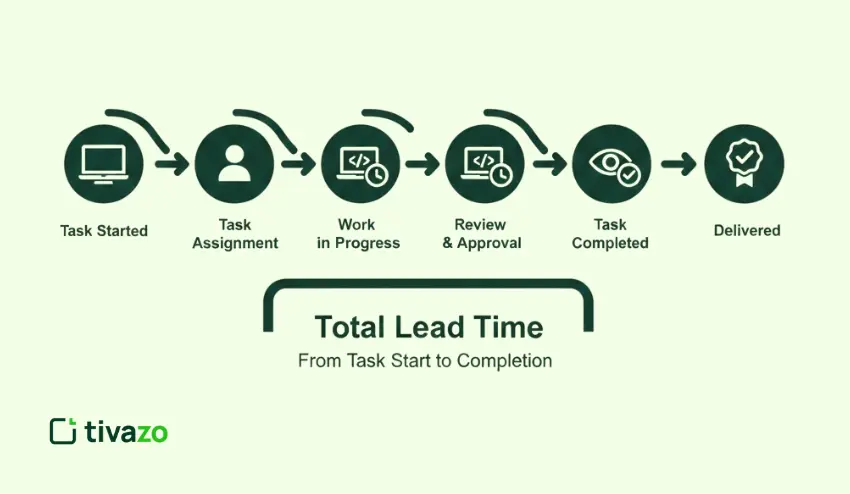Probably one of the most underestimated issues of the current work culture is toxic productivity. It is when you go an extra mile to work despite your physical and mental health being compromised. When you take a break, you feel guilty instead of feeling accomplished. In the long run, such an attitude is counterproductive.
It has been aggravated by the emergence of the hustle culture and the never-ending pressure of social media. We observe individuals boasting of 16-hour workdays and missing meals as a mark of pride. However, the fact is that overwork does not always increase productivity; sometimes it destroys it. Have you ever felt that resting is a waste of time? Then you are probably already in the vicious cycle of toxic productivity.
So how do we identify it, what are the causes and how can we replace it with healthier more sustainable habits that still allow you to reach your goals?
Key Highlights:
- What is Toxic Productivity?
- Healthy vs. Toxic Productivity
- What Causes Toxic Productivity?
- Do I Have Toxic Productivity?
- Red Flags of Toxic Productivity
- Why Toxic Productivity is Harmful
- The Psychology Behind Toxic Productivity
- How to Avoid Toxic Productivity
- How to Recognize and Combat Toxic Productivity in the Workplace
- How to Break the Cycle & Overcome Toxic Productivity
- Replacing Toxic Habits with Healthy Productivity
What is Toxic Productivity?
Toxic productivity is an unhealthy obsession with being productive at all costs. Toxic productivity, unlike healthy productivity, ignores personal boundaries. You may be overworking yourself even when you are exhausted or avoiding friends because you think it is not fruitful.
This mindset can be applied in personal life, freelancing or corporate life. It thrives in the environments where hustle cultures are all about quantity, not quality. The reality is that productivity is not about being busy all the time but a meaningful and sustainable change.
Healthy vs. Toxic Productivity
The first step to ending the cycle of toxic productivity is to clearly understand the distinction between healthy and toxic work habits. A lot of individuals confuse the two and think that they are simply being productive when they are in fact exhausting themselves.
Healthy productivity:
Healthy productivity is about working with purpose while respecting your mind and body.
- Balances were put on work and frequent rest.
- Physically and mentally values the health as part of the process.
- Covers healthy food, water, and adequate rest to maintain performance.
- Gives time to hobbies, rest, and quality time with loved ones.
- Does not reward short term burnout-based output but promotes long-term consistency.
Toxic productivity:
Toxic productivity is based on the idea that you are valuable only by what you produce.
- Guilt trips you into resting or taking breaks.
- Takes downtime as a waste of time instead of recovery time.
- Causes you to miss meals or sleep so that you can work more.
- Disregards or ignores such warning signs as headaches, fatigue, or irritability.
- Promotes the habit of always being in hustle mode even at the expense of health and relationships.
When you are healthy in terms of productivity, you do not work harder, you work smarter. You are consistent in your output, you have sustainable energy and your accomplishments are in line with your well-being. When you fall into the trap of toxic productivity, you work harder without actually making any gains and you tend to sacrifice quality over quantity.
What Causes Toxic Productivity?
Toxic productivity may be caused by a number of reasons:
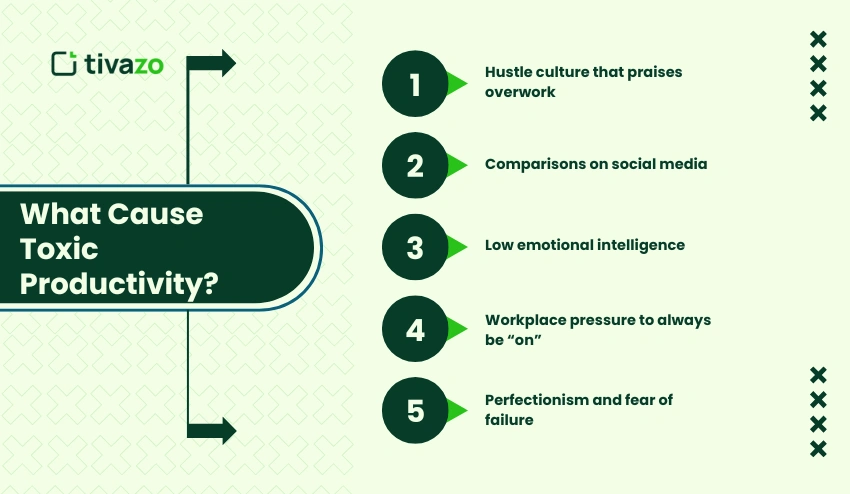
Hustle culture that praises overwork
The attitude of always grinding is seen as a badge of honor. It is a common belief that the longer one works, the more valuable he is. As a matter of fact, this continuous pressure may exhaust you and cause burnout. Hustle culture does not encourage balance or rest- it is the reward of sacrificing health and personal time to work.
Comparisons on social media of curated perfect lives
Browsing LinkedIn, Instagram, or TikTok might make you feel like everyone is accomplishing more in less time. However, what you see is never the whole picture-it is a highlight reel. These posts may cause you to think that you are not doing enough and you will have to work longer hours to merely keep up with an unrealistic standard.
Low emotional intelligence about personal limits
When you are unable to identify or respect your own boundaries, then it becomes easy to fall into overworking. Emotional intelligence assists you in realizing when you are stressed, tired or overwhelmed. Without it, you may disregard the signals your body and mind send you and you will end up with an unhealthy work pattern.
Workplace pressure to always be “on”
Some businesses require immediate response to messages, emails, late at night or even on weekends. This pressure may make you feel unable to take a break even when it is off-hours. In the long run, you can no longer distinguish between your work and home life, which is a source of toxic productivity.
Perfectionism and fear of failure
When you think that everything you create should be perfect, you will most probably spend too much time doing things and overworking yourself. Perfectionism is commonly accompanied by fear of failure- rest can then be perceived as a waste of time that could have been used to get it right.
These causes are frequently overlapping. An example is that a competitive office might reward overworking, and social media supports the idea that rest is laziness. When you know the cause in your own life, you will be able to address the correct solution.
Do I Have Toxic Productivity?
Here’s a quick checklist. If you relate to several points, you may be stuck in the cycle:
- You feel guilty when you’re not working.
- You skip meals or ignore your physical health to finish tasks.
- You see relaxing as a waste of time.
- You are constantly pushing yourself to exhaustion.
- Your self-worth depends on how much you accomplish daily.
If these sound familiar, you may be operating in a way that is toxically productive—and it’s time to make changes before burnout hits.
Red Flags of Toxic Productivity
The symptoms do not always appear immediately. But they increase with age:
- Physical and mental health problems such as sleeping poorly, headaches, or chronic fatigue.
- Emotional burnout-feeling numb, stressed, or irritable.
- Not taking rest days or hobbies as they are unproductive.
- Evaluating self-worth in terms of output.
These red flags are your body telling you that it is time to slow down. Neglecting them will ultimately lead to poor performance, bad relationships and general unhappiness.
Why Toxic Productivity is Harmful
The harm you get from toxic productivity is more than just exhaustion,
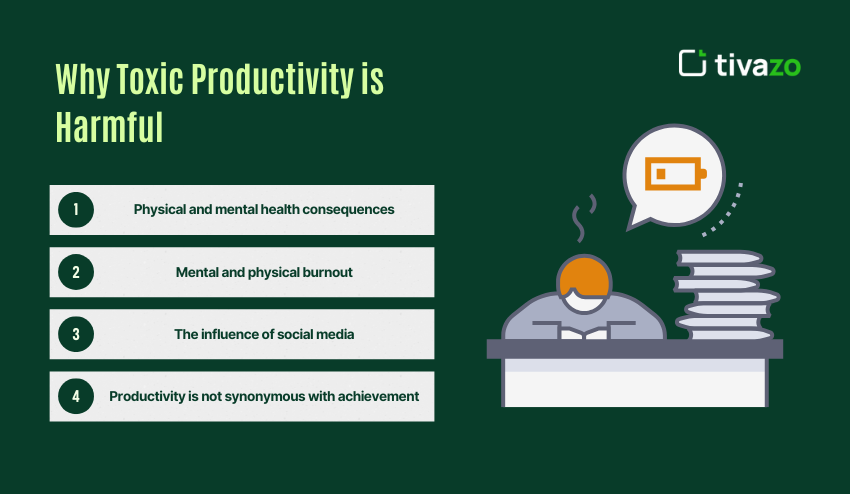
- Physical and mental health consequences- Constant overworking causes stress, fatigue, sleep disturbances, and even a compromised immune system, which makes you more susceptible to disease.
- Mental and physical burnout- Overperformance over an extended period of time depletes motivation, lowers creativity, and increases difficulty in concentrating on even the simplest things.
- The influence of social media – The repetition of posts about hustle on social media may normalize overworking, and it will be more difficult to understand that you are overworking yourself.
- Productivity is not synonymous with achievement- Just because you are busy does not mean you are actually achieving anything of value or satisfaction.
In brief, unhealthy productivity is not sustainable. It may cause long-term health problems and even career failure without change.
The Psychology Behind Toxic Productivity
In the eyes of a clinical psychologist, toxic productivity is frequently a coping mechanism. Constant work is often used by many people to escape unpleasant feelings such as anxiety, fear, or uncertainty. When you are always on the move, you do not need to confront hard feelings and questions about your self-worth. Working too much is a distraction, a method of feeling in control when the rest of life is unpredictable.
Also, there are individuals who connect their identity and worth to the extent of their achievements. Their self-worth is based on whether they are productive at all times. This relationship may lead to an extreme amount of pressure to continue on, despite their physical and mental health being damaged. When one rests or takes a break, it causes a feeling of guilt or failure, which is a part of a vicious cycle.
This is where emotional intelligence is important. Emotional intelligence is the ability to know how you feel and how you are physically, to know when you are becoming stressed and your limits. It assists you to be realistic in your goal setting and makes deliberate decisions on when to accelerate and when to rest-without self-criticism.
Without this understanding, warning signs can be overlooked and one can fall further into detrimental work patterns. Increasing emotional intelligence will help you to escape the trap of toxic productivity through the realization that rest and balance are not only a component of real success but not a weakness.
How to Avoid Toxic Productivity
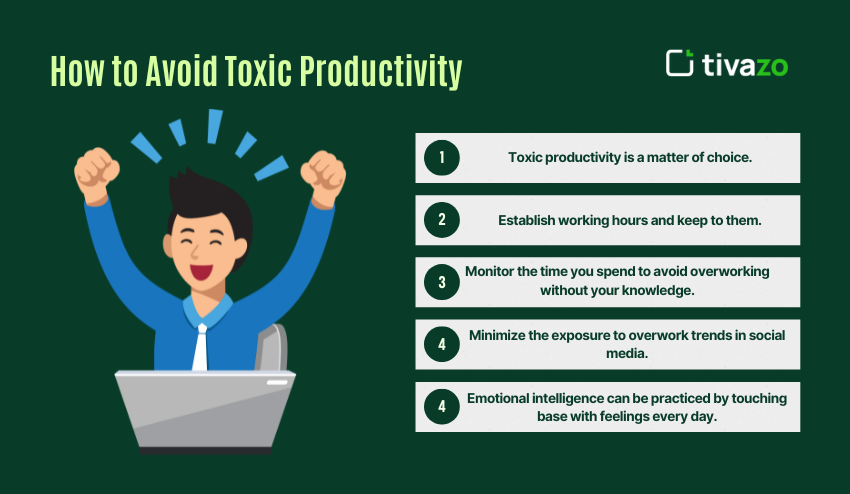
Avoiding toxic productivity is about intentional choices.
- Toxic productivity is a matter of choice.
- Establish working hours and keep to them.
- Monitor the time you spend to avoid overworking without your knowledge.
- Minimize the exposure to overwork trends in social media.
- Emotional intelligence can be practiced by touching base with feelings every day.
These little things make your work-life balance healthier and allow you to concentrate on what is really important.
How to Recognize and Combat Toxic Productivity in the Workplace
Toxic productivity is not a personal problem; it can be transmitted within an organization.
- Be alert to teams that celebrate working late or missing breaks.
- Make work-life balance a company policy.
- Encourage mental health conversations.
- Train managers to count success in results rather than in hours.
Healthy workplaces produce better long-term results. A culture shift can reduce turnover and improve employee well-being.
How to Break the Cycle & Overcome Toxic Productivity
It takes a combination of attitude and behavioral modification to escape:
- Take back your time- Plan rest as you do meetings.
- Focus on healthy lifestyles- Get enough sleep, eat healthy and exercise.
- Question hustle culture – Appreciate results, not time.
- Restrict social media -Avoid the trap of comparison.
- Increase efficiency through sustainable systems, rather than overworking.
One step leads to another, and you will have a lifestyle in which you will be able to work efficiently without sacrificing your health.
Replacing Toxic Habits with Healthy Productivity
After you have identified unhealthy patterns, substitute them with healthier ones.
- Enroll in online time management or mindfulness classes.
- Outcome-based, not time-based.
- Develop a work-life balance strategy to accommodate career and personal objectives.
In the long term, such changes will make you feel more in control and less guilty about taking a break.
Final Thoughts
Toxic productivity is addictive and may appear to be ambition but it is a trap. It drains you of physical and mental energy and gives you the illusion of progress.
The good news is that you can prevent the cycle. Setting boundaries, enhancing emotional intelligence, and focusing on valuable results will help you work smarter and live better.
Productivity should not devour your life. One should bear in mind that resting does not mean wasting time. It is an investment towards your future success.

